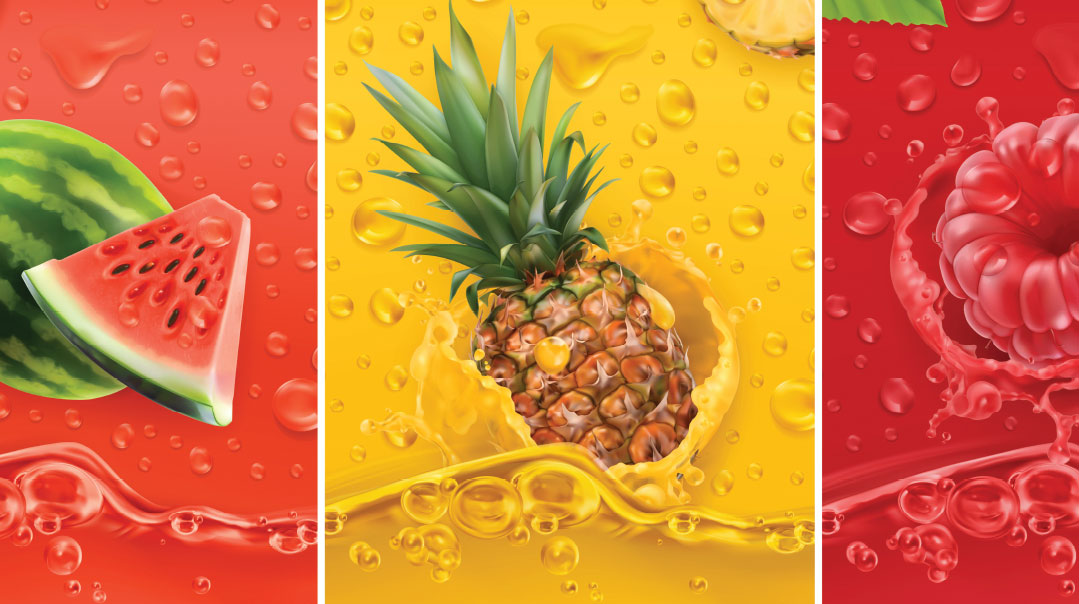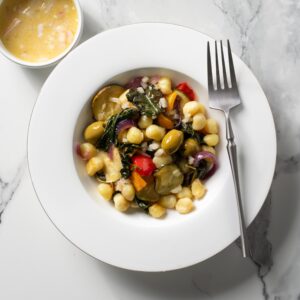Fruit in the Limelight

In honor of Tu B’Shevat, we set off to explore new worlds behind the fruit we eat

"Fruit makes the healthiest snack.”
“It’s one of your five-a-day.”
“Oranges are full of vitamin C.”
“An apple a day keeps the doctor away.”
Recognize any of the popular statements above? Fruit is good for you — it’s been ingrained in you since childhood.
But why is fruit good for us? How much fruit should we be eating? And is there such a thing as eating too much fruit?
Shira Savit, M.A., M.H.C., C.H.C, an Eating Psychology and Nutrition Counselor based in Israel, gives us some insight and background for starters.
“Eating fruit has many benefits,” Shira says. “Fruit is loaded with essential minerals and nutrients such as vitamin C, vitamin A, folate, potassium, and antioxidants. Fruit is a great source of dietary fiber, which helps your body digest other food. In addition, fruit is a simple carbohydrate, with naturally-occurring sugars, so it provides a quick energy boost.”
But, she cautions, not all fruit is created equal. “Some fruits have a very high sugar content, while others are lower. Some fruits have more water content — for example, watermelon. And even though nowadays we can pretty much get any fruit we want at any time, I believe it is better for our body, health, and digestion to eat fruit according to its season.”
Chaia Frishman, co-owner of Frishman Fruit Platters and More, reiterates this point. “Eating in season is the most important thing,” she tells us. “You have to eat oranges in the winter! Hashem ripens the oranges with vitamin C at a time of year when you’re going to get a lot of colds, and pomegranates when you need a lot of antioxidants, and watermelon in the summer when you need a lot of hydration, when it’s hot. Always try to eat fruit in season!”
Aside from these general guidelines, many fruits offer unique individual benefits. Shira lists a few. “Apples contain flavonoids, which may help lower the risk of diabetes and reduce symptoms of asthma. Raspberries are rich in antioxidants, and their ketone extract boosts metabolism, which can help burn fat. Pears contain a large amount of soluble fiber, which can help cure constipation, while strawberries are rich in folic acid, which strengthens and heals sore gums and cleans the blood of harmful toxins. Pineapples contain high levels of bromelain, which aids in digestion, can help prevent blood clots, and helps wounds to heal. And peaches have high levels of vitamin A, which helps strengthen the immune system.”
Are you convinced yet?
With its 92% water content, watermelon is great to eat before a fast, or anytime you want to up your water intake while enjoying a tasty treat. Just remember, Chaia warns, “Try to keep watermelon away from other fruits because it gives other fruits a bad taste.” She adds that it’s vital to take apart fruit platters (after they’ve been photographed, of course!) and put them in the fridge, separating each type of fruit. “That way, the flavors won’t mingle,” she explains.
Although it doesn’t get as much limelight as oranges and lemons, grapefruit is one of the healthiest citrus fruits. Besides being a good source of vitamins and minerals, it is known for its ability to aid weight loss and reduce insulin resistance. But beware, grapefruit juice can be dangerous when combined with certain medications. Check with your doctor to clear any concerns.
And for all those diehard orange fans out there, kiwi actually has more vitamin C than oranges, and can help strengthen bones and teeth. Go kiwis!
While we’re busting myths, here’s another shocker. Five-a-day, according to Shira, is simply untrue.
“Many of my nutritional recommendations are based on the teachings of the Rambam,” she explains. “The Rambam says in Sefer Hamada: A person should not have a lot of fruit, should avoid dried fruit, and shouldn’t eat fruit before it is ripe (it’s considered a sword for the body!). He writes that figs, grapes, and almonds are the best fruit for us to eat, but even those should be eaten in moderation.”
Although that doesn’t mean that fruit is bad, it just means we should be aware of its actual nutritional value so we can make informed food choices.
“Many times we label fruit as ‘healthy’ or a ‘good’ food and therefore eat an excess amount of it, even if we aren’t hungry,” Shira says. “One of my clients, a 16-year-old, came to see me for weight loss. She told me she ate ‘so healthy’ and every time she wanted to have junk food she ate fruit instead. There were some days she ate up to 10 to 15 servings of fruit! I explained to her that fruit has a very high sugar content, and therefore can add up to a lot of calories.
“She looked shocked when I told her to have a chocolate chip cookie or even a few potato chips as opposed to her usual fare of five bananas in one sitting. It actually would be a better tactic for losing weight (no, I am not advocating chocolate chip cookies on a regular basis). But this client started to lose weight by learning to eat the food she enjoys, in moderation, and making choices based on the nutritional guidance I offered her.”
Any other points to keep in mind when we make a selection from our Tu B’Shevat fruit platters?
“Dried fruit and fruit juices are high in sugar, and nutritionally, they don’t compare to fresh fruit,” Shira warns. “Another high-calorie culprit is a fruit smoothie, which is a popular ‘health’ product. A smoothie is usually very high in sugar, which means it will be high in calories. I advise my weight loss clients to choose smoothies with a combination of fruit in addition to vegetables, use unsweetened almond milk or unsweetened soy milk as a base, and add in a healthy fat to help the body metabolize the sugar in the most efficient way.”
It’s good to know how to eat your fruit to get the most out of it. Did you know that the stalk, rind, or skin of a fruit is typically more nutritious than the actual fruit itself? So, if you peel your fruits before eating them, you may be making a nutritional mistake.
Think out of the can when it comes to canned goods, too. Some fruits are overly sugared and jellied when they’re preserved, and they end up doing more harm than good. To get the full benefits of cranberries, for instance (the antioxidants called proanthocyanins in cranberries halt the activity of bacteria that can cause dental cavities), look for fresh cranberries and make your own cranberry sauce instead of using the canned alternative. In fact, the more fruit-derived products you can make from scratch, the better — your juice/smoothie/shake can contain less sugar, preservatives, and harmful stuff than commercial products.
Another thing to remember: “It’s not where you get your fruit from, it’s recognizing what’s considered good fruit,” Chaia says. “Learn how to recognize good fruit — and remember, it might not be in the fancy fruit store.”
Funny, Funky Fruit Uses
Fruit doesn’t have to be used in the conventional manner that most of us are used to. Though many of us are more than happy to enjoy our kiwis cut, diced, or sliced, some fashion gurus thought it would be much more fun to use funky pieces of dried fruit as jewelry. Huh?! How does that work? According to our research, it’s not even so complicated, and could be a fun activity to do at home, even if the jewelry is just for Purim! Here’s what to do:
First, slice the fruit (whichever one you choose; we suggest something brightly colored and interesting) into ultra-thin slices, then cover with a mixture of a teaspoon of cornstarch, boiled up with 100 ml of water. This helps the fruit remain vibrant in color, and reduces the likelihood of shrinking. The next step, dehydrating the fruit, can be done by placing it either in the oven for five to six hours, or in a special dehydrating machine, made for drying fruit (which most people don’t own). Once the fruit is dried, you’ll need basic jewelry supplies, such as earring hooks and pins, which you will then poke into the hardened fruit slice to create your masterpiece. To make the fruit last longer, you might want to invest in some resin, a preserving agent, to pour on your jewelry and help the fruit stay shiny and strong. Sound simple enough? Enjoy your new earrings and get ready for some interesting looks from your friends and family!
Another more common use of fruit and veggies (or their peels) is for beauty products. There are literally thousands of creams and moisturizers out there boasting ingredients such as cucumber or avocado, and that’s because there is nowhere better to get nutrition for all parts of us than fruit, which is so easily accessible. Avocados in particular are known to give a great moisturizing boost for dry skin or hair. Simply leaving the peels on your hair or face for 20 minutes will give you a softer, well-nourished, and glowing countenance. Definitely worth a try!
However, if you’re not in the mood for covering your skin in fruity peels, don’t worry. There are still other uses for these versatile gifts, including sweetening up your hydration. Many of us struggle to drink enough each day, and even if we do, we’re often hydrating ourselves with too much sweet stuff — lots of fruit juice or even fizzy drinks. But there’s hope for healthy and tasty hydration: infuse your water with fruit. Leaving a few pieces of fruit in your water bottle or pitcher can add that hint of sweetness that makes all the difference, and encourages you to drink more. A bonus here is that you get vitamins in there, too, and some say that infused water makes a great detox. Win-win-win! Just make sure you wash out that bottle really thoroughly when you’re done to make sure there’s no old fruit sitting around. Compost is great, but not for humans!
Oh, and one more thing: You know how people down Coke or coffee in excess when they want to pull an all-nighter? (Not a great idea, by the way, for many reasons.) Well, scientific research has actually found that the mineral, vitamin, and natural sugar content in a trusty old apple will be the most reliable method of staying awake, alert, and aware. Got midterms coming up? You now know what to eat. Look after your body and it will look after you!
It’s the Pits!
We generally think of the Shivas Haminim as one big fruit basket. Actually, since wheat and barley are types of grain, only five of the seven special species of Eretz Yisrael are fruit: olives, dates, grapes, figs, and pomegranates.
Think about those fruits for a moment. Are they similar? Not at all. And especially not when you consider their pits. Take the olive: It has a bitter pit, which you’d spit right out. On the other hand, the date’s pit is sweeter, so you might keep it in your mouth before spitting it out.
Then there are the pits that you actually eat. The grape’s pits are tiny and easy to swallow — you don’t really notice them much. The fig’s pits are part of the fruit. And when it comes to the pomegranate, the pit is the fruit! There isn’t anything else to eat in the pomegranate besides its pits — the famous seeds.
Many mefarshim explain that this is a message for life. Sometimes, things are tough — life, in fact, is the pits! But what kind of pits?
The olive represents the least mature perspective on life’s challenges — spit it out right away! We find the pit bitter and horrible, and we want to get away from it as fast as possible.
Growing up, we start comparing challenges to date pits: while we might spit them out, we begin to realize that we’ve grown from our past struggles. We still resist the challenges, but they are a little bit sweeter because they help us become greater people.
Later on, we learn to employ the grape mentality when we realize that pits are just a part of life — and we can swallow them. Little annoyances crop up, or even bigger challenges, and we learn to let go and ride the waves even while things aren’t so easy.
As we get older, and even more mature, we understand that the pit is part of the fruit! We understand the value that results from our struggles. We might not like them, but we understand them, and we can even welcome them.
But the highest level of all? That’s the pomegranate. It comes from knowing that challenges are not something to spit out, or even to swallow — they are the purpose of life itself. We’re alive to struggle and to succeed, to battle and to overcome — and we know that when we’re in the pits, we find our greatest, best selves.
(Heard from Rabbi Mordechai Kalatsky)
Bet You Didn’t Know…
By this point it’s probably pretty clear to you that your ordinary fruit isn’t so ordinary after all. Let’s take a look at a few other interesting facts you might not know about fruit.
Take, for example, the strawberry. Any idea where the strawberry’s seeds are found? Yup, you’re right, they’re not on the inside. They’re just there, in plain sight, on the strawberry’s skin. And by the way, they’re actually called “achenes.” These tiny achenes aren’t even just seeds. They are miniscule fruit that contain seeds. Fruit really is cool.
Fruit comes in all sorts of shapes and sizes, as you’ve probably seen. Maybe you’ve had a round peach one day, and one that is kind of flat and circular the next. But in some countries, such as Japan, practicality is the most important factor involved in fruit shape. Japanese supermarkets found that the normal oval watermelons were a terrible waste of space since their round shape made it hard to pile too many on top of each other. Their solution? Breeding and growing cube-shaped watermelons. And now? They stack their stock as high as the hills. You won’t find melons rolling around on the floor over there. Brilliant.
While we’re on the subject of melons, did you know that cantaloupe is the most popular melon in the entire United States? Take that, watermelon! But not all cantaloupes were created equal, you know. And if you want a really expensive birthday gift, you might be thinking of the Japanese Yubari cantaloupe. How much can a little old melon cost already? Well, to give you a vague idea, two of these beauties once sold at an auction for a whopping $23,500.70! Better start saving up! Or maybe just stick with the honeydew. It’s supposed to be the sweetest melon available.
Moving onto a slightly drier subject, the humble prune has had a surprising amount of press over the past few years. The discussion? Should these purple lovelies be called “prunes,” or “dried plums”? In fact, an entire society dedicated itself to this pressing question, conducting hours of research regarding this topic. The California Dried Plum Board was on a mission, and their goal was indeed accomplished over many months. The results were undoubtedly fascinating: Apparently, women aged 25 to 54 generally respond better to the name dried plums instead of prunes. I guess dried plums it is, then.
To be honest, fruity facts are endless. The more we researched, the more we unearthed, and there is truly no end to the incredible benefits and beauty of Hashem’s creations. “Ein tzayar k’Elokeinu,” there is simply no artist like Hashem, and each fruit is another reminder of this.
So next time you sneak a grape from the fruit platter, or even a piece of cantaloupe (Japanese Yubari of course!), we challenge you to take a closer look. See how the fruit has been designed in the most exquisite manner; how each creation is a masterpiece, put here for our benefit; how each one has a unique color, texture, and flavor, and each one has its own specific quirks and traits.
And when you challenge yourself to look further, you’ll see all kind of things that you might not have considered before. Perhaps you’ll see fruit with different eyes and a new appreciation. And who knows? Like in each of the Shivas Haminim, you might even find a message there, too — hidden in the simple fruit, which is not quite so simple after all.
PRESENTATION TIPS
Some tips for creating your own fruit platter: “The easiest fruit to use are blueberries and grapes, because you don’t need to slice them — although they do need to be cleaned,” Chaia says. “My favorite fruit? Pineapple is consistently good. And blood oranges are my most favorite because they add a pop of color to any platter and taste like fruit punch!”
Chaia recommends presenting fruit with a “like-with-like” approach. “If you make a platter of chunked fruit, then chunk everything, don’t chunk just some of the fruit and slice others.”
Give a gift: People always like fruit platters! Think about sending one instead of chocolate, cakes, or sweets for someone’s simchah.
Believe it or not, Tu B’Shevat is not the Frishmans’ busiest season for fruit platters. While it is busy, Chaia says that, “Rosh Hashanah is definitely busier than Tu B’Shevat. People send gifts to each other, and we sell lots of our famous shehecheyanu fruit baskets!”
(Originally featured in Teen Pages, Issue 797)
Oops! We could not locate your form.













